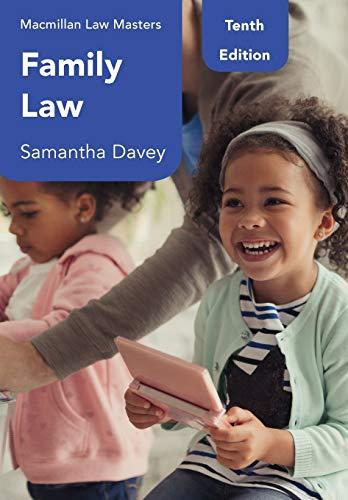Question
READ THIS OP/ED BELOW AND ANSWER THE QUESTIONS 5,6 AND 7 ANSWER THESE QUESTIONS: 5. Do you believe that the proposal in the Op/Ed is
READ THIS OP/ED BELOW AND ANSWER THE QUESTIONS 5,6 AND 7
ANSWER THESE QUESTIONS:
5. Do you believe that the proposal in the Op/Ed is a viable way to resolve this issue? Why?Why not? How important is originalism in any possible SC judgment?
6. Can you provide a link to an article outlining what you believe is a better course for the SC to take when judging these cases?
As the Supreme Courtweighs the future ofRoe v. Wade, one of thechief argumentsfor overruling the case and allowing states to ban abortions throughout pregnancy is that the right to abortion is inconsistent with the Constitution's original meaning.
The problem with this argument is that it is historically inaccurate. If the conservative justices wish to be faithful to the Constitution's original meaning, they should not eliminate the right to abortion. Instead, they should restore it to the position that characterized American society throughout our early history, recognizing a constitutional right to abortion early in pregnancy.
This understanding would allow states to prohibit abortion after 15 weeks, just as Mississippi has done in thecaseto be argued Dec. 1. But states could not ban abortions any earlier. A moderate ruling of this kind could be just what the court needs to restore itsbattered credibility.
As Justice Amy Coney Barretthas explained,originalism is the philosophy that the Constitution has "the meaning that it had at the time people ratified it." In the context of the 14th Amendment the provision thatRoeheld encompasses the right to abortion originalist justiceshave askedwhether a right is "deeply rooted in this nation's history and tradition."
Time and again, they've answered this question by pointing to a historical consensus under state law. As leading originalist and former federal judge Michael McConnellhas shown, the 14th Amendment's original meaning requires "a substantial consensus of the states" to recognize a right over time. Thus, when Justice Antonin Scaliadissentedfrom the court's2003 decisionrecognizing a right to same-sex sexual activity, his reason was that at the time the 14th Amendment was ratified in 1868, only five of the 37 states in the union permitted the practice.
The importance of a state-law consensus is why antiabortion advocates have long rested their argument on the similar claim that when the 14th Amendment was ratified, 27 of the 37 states banned abortion throughout pregnancy. The state of Mississippimakes this claiminDobbs v. Jackson Women's Health Organization,the pending case, and no fewer thanfiveamicusbriefsrepeatit.
This claim is wrong,grounded on a series of historical errors. The foundational mistake is the failure to grapple with the long-standing rule that abortion was legal so long as it was performed before quickening, the first noticeable fetal movement that often occurs at 15 or 16 weeks.
The concept of quickening is crucial because people understood it to represent the first sign of life. Sir William Blackstone, an 18th-century juristwhom originalists deema "preeminent" originalist authority,wrotethat abortion is unlawful onlyaftera "woman is quick with child" because that is when life "begins in contemplation of law." As historian James Mohr hasexplained, the "distinction between quick and unquick" pregnancies was "virtually universal" in 19th-century America.
This historical reality undermines the 27-state claim. For instance, antiabortion advocates include Oregon in their count. Yet Oregon'sown prosecutorsrecognizedin 1909 that, under the state's 1864 abortion law, "abortion is not a crime . . . unless it results in the death of the mother, or of a quick fetus."
Alabama and Nebraska are two other faulty examples. The Alabama Supreme Courtdeclaredin 1857 that abortion was not punishable by Alabama law unless "the woman was 'quick with child,' " a fact at least one pro-life writer hasconceded. And theNebraska statuteforbade only giving "any poison or other noxious or destructive substance" to a pregnant person. Safer abortion procedures remained legal.
The more accurate statement is that just16 of 37 statesprohibited abortion throughout pregnancy when the 14th Amendment was ratified. To put it in originalist terms,every single staterecognized the lawfulness of pre-quickening abortion at the founding. And a substantial consensus of states continued to embrace this deeply rooted tradition in 1868.
Even the 16 states that banned pre-quickening abortions should hold dubious weight for originalists. Their laws were enacted in response to anall-male medical lobbythat argued abortion was inherently "disastrous" to women's health and that a woman was so "prone to ... derangement" that she should not be "allowed to judge for herself in this matter." Originalism is bound no more by these distorted views than it is bound byhistoric lawsrooted in bigoted beliefs about white supremacy.
As much as this history undermines antiabortion forces who claim there is no constitutional protection foranyabortion right, it also suggests that the existing rule, which prohibits states from banning abortion until fetal viability at about 24 weeks, lacks originalist support. Virtually every state in 1868 banned abortion after quickening.
This outcome might be far from ideal for either side in the abortion wars. Yet in this deeply polarized moment, an originalist abortion middle ground may be the best the court and the American people can hope for.
Step by Step Solution
There are 3 Steps involved in it
Step: 1

Get Instant Access to Expert-Tailored Solutions
See step-by-step solutions with expert insights and AI powered tools for academic success
Step: 2

Step: 3

Ace Your Homework with AI
Get the answers you need in no time with our AI-driven, step-by-step assistance
Get Started


